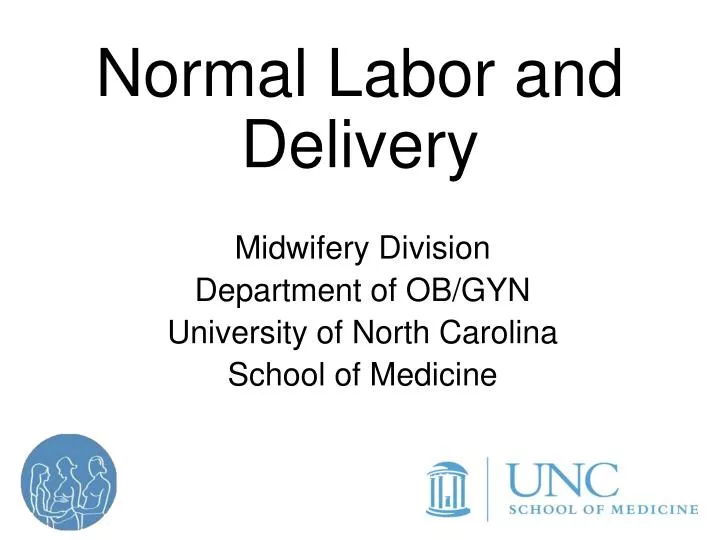

Normal Labor and Delivery
Jul 13, 2014
1.49k likes | 3.09k Views
Normal Labor and Delivery. Midwifery Division Department of OB/GYN University of North Carolina School of Medicine. OBJECTIVES. Define labor and its stages Exam of the laboring woman and her fetus Review the cardinal movements of labor and birth Review Disorders of Labor
Share Presentation
- prenatal lab work
- fetal monitoring late decelerations
- midwifery division
- ob gyn university
- internal rotation
- complications

Presentation Transcript
Normal Labor and Delivery Midwifery Division Department of OB/GYN University of North Carolina School of Medicine
OBJECTIVES • Define labor and its stages • Exam of the laboring woman and her fetus • Review the cardinal movements of labor and birth • Review Disorders of Labor • Induction of Labor • Other labor issues
Define Labor and its Stages • Labor: progressive change of the cervix in the setting of uterine contractions • Term Labor: > 37 weeks gestation • Preterm Labor: < 37 weeks gestation • 11% of all US births in 1997 • 80% of preterm births between 34 - 36 weeks • Preterm delivery < 35 weeks: 3.5%
Define Labor and its Stages • Stages of Labor • 1st stage – onset of labor until full cervical dilitation • 2nd stage – from full dilitation to birth of infant • 3rd stage – from birth of infant until delivery of placenta • 4th stage – 2 hours after the delivery of placenta
Define labor and its Stages1st stage and its phases • Latent phase: onset of contractions until active phase • Active phase: 3 cm dilation in nulliparas; 4 cm dilation in multiparas to deceleration phase • Deceleration phase: 8 – 9 cm dilation to complete dilation
Exam of the Laboring woman and her Fetus • Review of prenatal records and labs • Physical exam • 1. Vitals and routine physical exam • 2. Abdominal Exam • Palpation of contractions • Leopold’s maneuvers • 3. Pelvic Exam • 4. Fetal heart rate monitoring
Review of Prenatal Records • Allergies • Medications • Past medical, surgical, obstetrical, gynecologic, social and family histories • Routine prenatal lab work • Complications of current or past pregnancies
Abdominal Exam • 1. Palpation of contractions for duration and intensity • 2. Leopold’s maneuvers • To assess estimated fetal weight, fetal lie, presentation and position, attitude, and (a)synclitism
NORMAL LABOR & DELIVERYEstimated Fetal Weight • Leopold’s maneuvers (palpation of the maternal abdomen) • Ultrasound estimate of fetal weight (error of 10 – 15%) • Maternal estimate of fetal weight (best)
Fetal Lie • Lie: relationship between the long axis of the fetus and the mother • Longitudinal • Transverse • Oblique
Fetal presentation • Presentation: fetal part closet to pelvic inlet • cephalic • breech • shoulder
Fetal position • Position: relationship of fetal presenting part to the maternal pelvis • Occiput • Brow • Mentum • Breech • Shoulder
Fetal Attitude • The relationship of the fetal parts to one another (i.e. flexion extension of head relative to body).
Vertex Parietal Brow Face
(A)synclitism • Synclitism is when the biparietal diameter of the fetal head is parallel to the planes of the maternal pelvis.
Pelvic Exam • Pelvic Exam – sterile vaginal exam +/- sterile speculum exam • Dilation • Effacement • Station • Also position of cervix and consistency important.
Obstetrical Pelvic Exam • Dilation (dilatation): patency of the internal cervical os • 0 = “closed” • 10 cm = “complete” • Effacement: shortening of the cervical length • 0% = “thick” • 100% = “fully effaced”
Obstetrical Pelvic Exam • Station: level of presenting part (bony portion) in relation to the maternal ischial spines • Ischial spines = O station • Above spines: -5 to -1 • Below spines: +1 to +5
Obstetrical Pelvic Exam • Also includes same assessment included in Leopold’s maneuvers (fetal lie, presentation, position, etc.)
Fetal Monitoring • Intermittent • Continuous
Continuous Fetal Monitoring • Baseline rate • Variability • Presence of accelerations • Presence of decelerations • Changes or trends of FHR patterns over time • Contractions
Fetal Heart Rate Baseline • 10 minute window • Duration: at least 2 minutes • Bradycardia: < 110 bpm • Tachycardia: > 170 bpm
Fetal Monitoring (Variability) • Concept of short and long-term variability dropped • Absent: undetectable • Minimal: undetectable - < 5 bpm • Moderate: 6 - 25 bpm • Marked: > 25 bpm
Fetal Monitoring (Accelerations) • Onset to peak: < 30 seconds • > 32 weeks: >15 bpm X >15 secs • < 32 weeks: > 10 bpm X > 10 secs • > 2 minutes in duration: prolonged • > 10 minutes in duration: change in baseline
DECELERATIONSFetal Monitoring (Variables) • Onset to nadir < 30 secs • > 15 bpm below baseline • Duration: > 15 seconds • < 2 minutes from onset to return to baseline
DECELERATIONSFetal Monitoring (Variables) Treatment • Pelvic exam (rule out prolapsed cord) • Maternal oxygen • Change maternal position • Stop pushing • Amnioinfusion
Fetal Monitoring (Early Decelerations) • Onset to nadir > 30 secs • Coincident in timing with UC • Nadir occurring simultaneously with the peak of the contraction
Fetal Monitoring (Late Decelerations) • Onset to nadir > 30 secs • Delayed in timing • Nadir occurring after the peak of the contraction • Reccuring can be ominous
Fetal Monitoring(Late Decelerations) Treatment • Correct hypotension or other maternal conditions • Maternal oxygen • Scalp stimulation • Cesarean delivery if repetitive
Uterine Contractions External tocodynamometry Internal tocodynamometry
What’s going on in there? • The cardinal movements of labor are the mechanism by which the fetus moves progressively through the birth canal.
Cardinal Movements of Labor – Occurring during first and second stages of labor • Engagement: descent of biparietal diameter to the level of the ischial spines (0 station) • Often occurs before onset of labor in nulliparous patients • Descent • Flexion: presenting diameters of fetal head presenting to maternal pelvis are optimized
Cardinal Movements of Labor • Internal rotation: fetal occiput rotates from transverse to AP • Extension: head rotates under symphysis pubis • External rotation (restitution): occiput and spine assume same position • Expulsion: fetal body delivers
- More by User
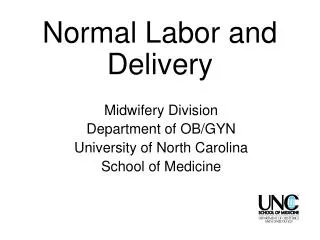
Normal Labor and Delivery. Midwifery Division Department of OB/GYN University of North Carolina School of Medicine. OBJECTIVES. Describe the maternal factors in birth List the various fetal positions and presentations Review the 7 Cardinal Movements Define the 4 stages of labor
3.21k views • 86 slides

Labor and Delivery
Labor and Delivery. Marcela’s Recipe for Having a Baby: 2 cup Mechanics 2 cups Hormones 3 cup emotional & physical support Mix and Stir with the three stages of labor Time: 8 - 48 hours Makes three: one new mom, one new dad and a brand new baby. Parturition. Birth of the baby
1.24k views • 23 slides
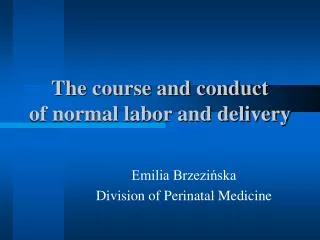
The course and conduct of normal labor and delivery
The course and conduct of normal labor and delivery. Emilia Brzezińska Division of Perinatal Medicine. A definition of labor. Progressive dilatation of the uterine cervix in association with repetitive uterine contractions. Spontaneous or induced Term or preterm. Important terms.
1.72k views • 28 slides

Normal labor and delivery
2. Objectives At the end of session, the student is able to. Diagnose true labor Describe factors influence vaginal birthAssess maternal and fetal conditionAssess progress of laborManage first stage of laborDescribe mechanism of normal vaginal deliveryDescribe steps for conduction vaginal de
1.96k views • 82 slides
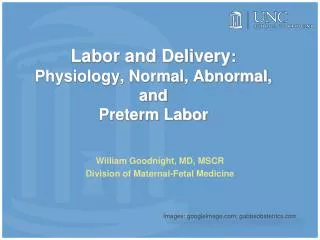
Labor and Delivery : Physiology, Normal, Abnormal, and Preterm Labor
Labor and Delivery : Physiology, Normal, Abnormal, and Preterm Labor. William Goodnight, MD, MSCR Division of Maternal-Fetal Medicine. Images: googleimage.com; gabbeobstetrics.com. Objectives. Describe physiology of initiation of labor Define normal and abnormal labor
4.97k views • 55 slides

Labor and Delivery. CAPT Mike Hughey, MC, USNR. Labor. Regular, frequent, leading to progressive cervical effacement and dilatation Braxton-Hicks contractions May be painful and regular, but usually are not Do not lead to cervical change Labor diagnosis usually made in retrospect.
886 views • 30 slides
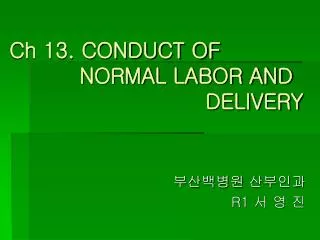
Ch 13. CONDUCT OF NORMAL LABOR AND DELIVERY
Ch 13. CONDUCT OF NORMAL LABOR AND DELIVERY. 부산백병원 산부인과 R1 서 영 진. The ideal conduct of labor and delivery - Birthing is recognized as a normal physiological process that most women experience without complication
2.56k views • 29 slides


Normal Labor and Delivery 正常分娩
Normal Labor and Delivery 正常分娩. 林建华. Labor : the process by which contractions of uterus expel the fetus. Delivery : receive the neonate. 1. definition. Term pregnancy: 37-42weeks from LMP pre-term delivery (labor): 28- <37 weeks of gestational age post-term delivery: 42 weeks
1.17k views • 24 slides

859 views • 30 slides

Normal Labor and Delivery Physiological Adaptations Chapter 17
Normal Labor and Delivery Physiological Adaptations Chapter 17. Presented by Ann Hearn. LABOR. The process by which the products of conception are expelled from the body. UTERINE CONTRACTIONS.
2.64k views • 53 slides

Normal Labor and Delivery. Valerie Robinson D.O. Contractions Become regular Increase in strength and frequency Cervical change: Dilation and Effacement Normal is >1.2cm/hour in P0, >1.5cm/hour in P>0 0% effacement is 3-4cm thick ROM may be spontaneous or assisted
651 views • 18 slides

Normal Labor and Delivery Physiological Adaptations
Normal Labor and Delivery Physiological Adaptations. Presented by Jeanie Ward. LABOR. The Process by which the Products of Conception are expelled from the body. Passenger. Essential Factors in Labor. Powers. Passageway. Psychological. THE
1.07k views • 37 slides

Normal Labor and Delivery. Nursing Care. Stage 1 -- Latent Phase Signs and Symptoms:. Contraction: dilate 0-3 cm. Mild Duration – 30-45 seconds Frequency – 5-20 minutes Scant pinkish discharge, bloody show Mother’s response Surge of energy and excited Talkative, outgoing Anxiety low
608 views • 32 slides

Normal Labor and Delivery. The Obstetrics and Gynecology Hospital of Fudan University Jing-Xin Ding . According to the New Shorter Oxford English Dictionary (1993), toil, trouble, suffering, bodily exertion, especially when painful, and an outcome of work are all characteristics of labor .
2.01k views • 121 slides

Labor and Delivery. Stages of Labor. The stages of labor are often thought to be a mystery. In all honesty it is a mystery in many ways. Each woman will have a different labor and yet many parts are the same. . Stages…1-4. Stage 1-Labor ends by being fully dilated.
709 views • 19 slides

Normal Labor and Delivery. The Obstetrics and Gynecology Hospital of Fudan University Jing- Xin Ding . Definition.
3.16k views • 157 slides

Normal Labor and Delivery. Nursing Care. Signs and Symptoms of the Stage 1 -- Latent Phase. Contraction: dilate 0-3 cm. Mild Duration – 30-45 seconds Frequency – 5-20 minutes Scant pinkish discharge, bloody show Mother’s response Surge of energy and excited
591 views • 24 slides

Normal Labor and Delivery Physiological Adaptations Chapter 17. Presented by Amie Bedgood. http://youtu.be/IPlqhw8AoQI. LABOR. The process by which the products of conception are expelled from the body. UTERINE CONTRACTIONS.
1.27k views • 54 slides

Normal Labor and Delivery Physiological Adaptations Chapter 17. Presented by Amie Bedgood. LABOR. The process by which the products of conception are expelled from the body. UTERINE CONTRACTIONS.
989 views • 53 slides

Normal labor and delivery. Definition of labor Causes of onset of labor Changes before labor (premonitory symptoms) True labor Essential factors of labor Stages of labor Clinical course and management of stages. Definition (1).
2.61k views • 130 slides
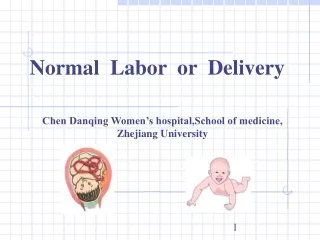
Normal Labor or Delivery
Normal Labor or Delivery. Chen Danqing Women’s hospital,School of medicine, Zhejiang University. Objective. Definition of labor. Determinate Factors of Labor Anatomical considerations: The female pelvis. The fetal skull. The stages of labor. The mechanism of labor (vertex, LOA).
1.19k views • 67 slides

Normal Labor and Delivery. Asja Ćosić Mentor: A. Žmegač Horvat. Labor. labor series of rhythmic, progressive contractions of the uterus gradually move the fetus through the cervix and birth canal main stages of labor
826 views • 12 slides

- My presentations
Auth with social network:
Download presentation
We think you have liked this presentation. If you wish to download it, please recommend it to your friends in any social system. Share buttons are a little bit lower. Thank you!
Presentation is loading. Please wait.
Understanding the stages of labour
Published by Shanna Elliott Modified over 6 years ago
Similar presentations
Presentation on theme: "Understanding the stages of labour"— Presentation transcript:

I’m Going Into Labor!!! (What do I do now?).

Chapter 5: Time to be born!

Journal What will it be like to give birth to a child (or to have your wife give birth)? Do you want to do it all naturally? Do you want to be in a hospital?

Pregnancy. The Beginning of the Life Cycle Fertilization/Conception The process of sperm meeting with an egg in the Fallopian tube Once an egg is.

Chapter 5: Time to be born!. What are the possible signs that labor has begun? Contractions: tightening and releasing of uterine muscles Braxton Hicks:

What are the stages of labor? First Stage- begins with the beginning of contractions that cause progressing changes in your cervix and ends when your.

Length of Pregnancy A full term pregnancy is weeks. A full term pregnancy is weeks. Three trimesters of about 3 months each. Three trimesters.

I’M GOING INTO LABOR!!! (What do I do now?). Labor Labor is the energy and effort used to push the baby out of the womb. Dilation is when the cervix.

Preparing For Birth.

Childbirth Process.

How does it start? What are the stages? Are there signs?

Labor & Birth. Childbirth Options Prepared Childbirth- means reducing pain and fear during the birth process through education and the use of breathing.

Child Birth Being prepared.. Prepared Child Birth Prepared child birth is a method of giving birth in which pain is reduced through the elimination.

LABOR AND DELIVERY BIOLOGY 30 WILLENA & ALIDA MRS. PROCEE Click to add subtitle.

Parenting & Child Development

For 9 months, the unborn child has been developing in the womb. Now the baby is ready to make an exit. Prelabor is a period of irregular uterine contractions.

Labour and Delivery Psy 30 Spiritwood High School.

Labor and Birth Chapter 6.1.

Labor and Birth. First Stage of Labor Early sign of labor: Early sign of labor: –Lose the mucus plug – water may break Contractions are the tightening.
About project
© 2024 SlidePlayer.com Inc. All rights reserved.

IMAGES
VIDEO